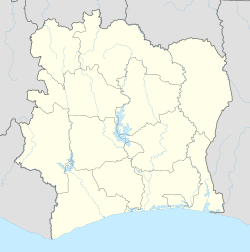Attack
Three armed assailants [5] attacked the Étoile du Sud hotel which, according to Agence France-Presse, was occupied by numerous expatriates at the time. [6] [nb 1] According to officials, 15 civilians and three special forces soldiers were killed. [8]
The attackers were described as African, armed with Kalashnikov rifles and grenade belts and dressed in casual clothes and balaclavas. [3] A shootout occurred between the attackers and police as the assailants reached the La Paillote Hotel. Local residents and tourists were evacuated by army personnel from the beach to nearby hotels, which were temporarily placed on lockdown. [9]
The Associated Press quoted Government officials as saying that security forces had killed six armed men. [10] [11] The terrorists allegedly shouted "Allahu Akbar". [12] An American embassy delegation was at Grand-Bassam on the date of the attack, but the US Embassy in Abidjan said on Twitter that there is "no evidence that U.S. citizens were targeted nor confirmed reports of any U.S[ sic ] citizens as harmed." [13] [14] French authorities had warned both Ivory Coast and Senegal weeks earlier of the danger of a terrorist attack. [15]
Al-Qaeda in the Islamic Maghreb (AQIM) and al-Mourabitoun claimed responsibility for the attack. [16] On 17 March, AQIM released the names of the attackers: Hamza al-Fulani and Abu Adam al-Ansari from al-Mourabitoun and Abderrahmane al-Fulani from the "Emirate of the Desert". [17] It had been the third bloody attack on a tourism resort in West Africa for four months. In all, dozens of people fell victim to the assassinations and more were injured. [18] [19]
This page is based on this
Wikipedia article Text is available under the
CC BY-SA 4.0 license; additional terms may apply.
Images, videos and audio are available under their respective licenses.

